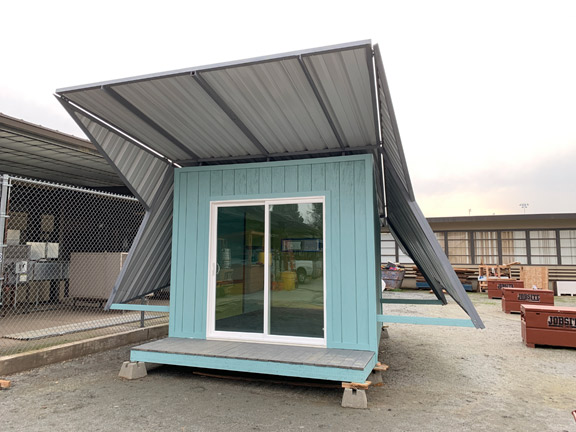About a year after a team of Fresno State construction management students was tasked with designing and building a temporary home to help raise awareness of homelessness in the Valley, their 100-square-foot prototype was presented to the Poverello House for use in the community.
“This is a great opportunity to provide our homeless clients a unique, innovative living environment while receiving life changing services at Poverello House,” said Cruz Avila, chief executive officer of Poverello House. “We are so grateful that so many different members of our community came together to design and build a structure to shelter our homeless population. The time, treasure and talents that people used to build this project is a testament to our homeless community that we care about them and their situation. These people and students who dedicated their time on this project are dedicated to bringing positive change in our community.”
The prototype was presented by the Department of Construction Management in the Lyles College of Engineering on Feb. 21, between the Engineering East and Engineering West buildings in Lot P21 on the Fresno State campus.
In spring 2018, the initial design concept of the shelter prototype was presented to the team of four students by architect Arthur Dyson in the form of a paper model and preliminary floor plan.
“The inspiration was to design a space that would not only provide shelter from inclement weather, but also be comforting and uplifting,” Dyson said. “The layout is based on geographer-poet Jay Appleton’s human response principles he called “Prospect-Refuge Theory.”
The following semester, the students collaborated with Fresno State professor Silvana Polgar’s interior design class to choose the design and color palate for the interior of the shelter. Both groups of students visited the Poverello House, where they observed the conditions of the existing shelters and learned about the living challenges and needs.
“It was an eye-opening experience that instilled students’ empathy and new perspectives towards the homeless community,” said Dr. Vivien Luo, associate professor of construction management. “Throughout the project, they learned how design and construction could be powerful tools to generate solutions to social problems.”
After their visit, the construction management team updated their plans and digital models and developed a detailed cost estimate.
“It was particularly gratifying to see the enthusiastic spirit in which the construction management students approached this project. I believe that they could sense the importance of such a structure in the life of a homeless individual,” Dyson said.
Because the life of a homeless person or family can be very stressful, the interior design class conceptualized a visual and uplifting distraction with colors and patterned lines in the shelter that delimited simple shapes of the exterior. The look they chose is intended to evoke calmness, tranquility, stability, strength and dignity. The blue particularly conveys tranquility and the green contributes to relaxation and symbolizes nature.
Liquid rubber paint, acquired at a discounted rate from the company Dura Rubber, was used for the interior. The walls, floor and ceiling were all painted with water-based, waterproof, chemical resistant and low volatile organic compound paint.
“Plywood was also chosen over drywall for sheathing since drywall is susceptible to cracking,” Luo said. “All corner seams and cracks were sealed using an embedded reinforcement fabric provided by the paint manufacturer, which further prevents the infestation of bedbugs — a major problem in homeless shelters. A drain was installed inside the shelter to allow for an easy and thorough rinse off with a high-pressure water hose.”
Support of the project also came through material donations valued at $7,000 from Webcor Builders, BORGA Steel Buildings, Components, Valley Iron, Inc., Wicks Fabrication, Inc., and the Construction Management Department. The Energy Star Certified cool metal roof panels were donated by BORGA.
For more information, contact Lyles College communication specialist Rebecca Wass at 559.385.1336 or rwass@mail.fresnostate.edu.





